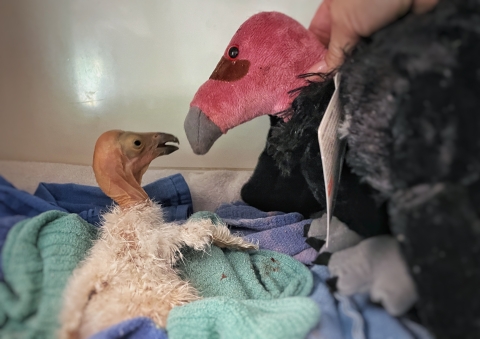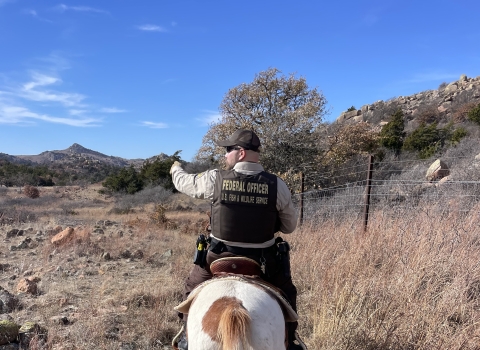The U.S. Fish and Wildlife Service’s Incident Command Team, in collaboration with partner agencies, continues to respond to Highly Pathogenic Avian Influenza (HPAI), also known as bird flu, in the Southwest flock of California condors. Partners and stakeholders are working to enhance supportive care facilities for recovering birds and a newborn chick, maintain support for field operations and monitoring, coordinate with USDA regarding potential vaccination of condors and develop long-term strategies for potential future HPAI outbreaks. The Incident Command will provide updates in this format on a routine basis until further notice.
Incident Update
On March 28, The Peregrine Fund captured a distressed female with an active nest for treatment; she was later confirmed HPAI positive and died. The male diligently continued to incubate the egg; however, there was concern for his health if he continued to stay in the nest cave, which was suspected to be contaminated with HPAI from the female.
The Incident Command decided to attempt collection of the egg to encourage the male to move out of the nest cave. Field crews safely accessed the nest and the egg, which then went to Liberty Wildlife for care and incubation. Just this week, on May 9, the egg successfully hatched. The chick is healthy and tested “negative” for HPAI. Partners tentatively identified foster parents at The Peregrine Fund’s captive breeding facility to raise the chick and maximize the likelihood it can be released back into the wild. Liberty Wildlife, who has experience raising raptors, continues to care for the chick until transfer.
Status of HPAI in the Southwest Flock as of May 12, 2023
Changes are indicated in bold in our reporting below. Please note the number of deceased and confirmed HPAI positive birds may not match as the mortality count includes unrecoverable birds that will not be tested for HPAI and rescued birds in care.
Mortality:
- Total mortality: 21 condors
- Deceased and recoverable: 17 condors
- Deceased and unrecoverable: four condors
Rescues:
- Number of condors in care: five condors (including the newborn chick)
HPAI Results:
- Total condors tested: 21 condors
- Confirmed HPAI positive: 15 condors including two of the rescued condors at Liberty Wildlife (four samples remain pending)
- Confirmed HPAI negative: two condors in care at Liberty Wildlife
Breeding pairs impacted: eight breeding pairs (13 individuals deceased)
Response Tactics
Partners are caring for recovering birds, evaluating care and quarantine facilities, identifying where improvements are needed and developing strategies should another HPAI outbreak occur in condors.
Rescued condors 757, 982, 1061 and 1108 are in care at Liberty Wildlife and partners will determine when it safe to release them back in the wild.
- Condor 982's initial tests did not confirm the presence of the virus, however her antibody test indicated she was exposure to the virus.
- HPAI virus is no longer detected in condors 757 and 1108. As a result of surviving HPAI, both birds are showing antibodies for the virus.
- Condor 1061 was captured out of an abundance of caution after exhibiting lethargic behavior and has never tested positive for HPAI.
Access to terrain for monitoring activities is improving with snowmelt. The Peregrine Fund, with support from Arizona Game and Fish Department and National Park Service, will fly on May 15 to monitor and track radio tagged condors.
The Peregrine Fund continues to lead daily operations of monitoring and management of the flock throughout the range and at various known gathering sites including the release site on the Vermilion Cliffs National Monument. Grand Canyon National Park and Zion National Park are monitoring portions of the flock within their respective management areas and have offered additional support as needed. The Peregrine Fund continues to manage the flock to avoid congregation of birds through discontinuation of communal feeding sites and watering areas. We continue to evaluate when conditions will allow for condor releases to resume.




